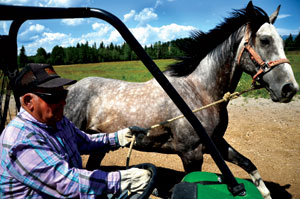FORTINE – R.D. Mower, 82 years old and nearly blind from recent cataract surgery, yanks on a long rope attached to one of his colts and barks commands. The colt obeys and runs in tight circles, a young racehorse coming of age under a hot August sun.
On a nearby hillside, Mower’s 70-year-old wife Karen rumbles down a pitted gravel road on a mountain bike. She shouts something about lemonade and Mower looks around, trying to locate her.
“Where are you?” he yells.
Karen waves her arms and calls out: “Here!” She looks over to one of her visitors and smiles gently.
“He can’t really see since that surgery,” she says. “That’s why he’s wearing those dark glasses.”
“People ask him, ‘Are you out of your mind to keep doing this?’ He says, ‘As long as I can move – as long I can still kick around – I’ll keep doing it.’”
Mower has been training racehorses in Northwest Montana since the 1950s and it’s hard to imagine what it will take to make him stop. Sixteen screws in his back didn’t stop him, nor did fading vision or missing fingers. His right hand, which still offers a solid handshake, has three and three-quarters fingers, perhaps a remnant from his ironworking career or simply the hard life he’s lived.
This summer Mower will once again enter his horses into a drawing to participate in the Northwest Montana Fair horse races, as he has done nearly every year the fair has offered racing since the early 1950s. The fair is held Aug. 17-21 at the Flathead County Fairgrounds in Kalispell.
Last week, after taking a couple of days off after his eye surgery, Mower was busy working with three colts at his property in Fortine. The property includes a half-mile racetrack made out of wood shavings from the now defunct Ksanka sawmill.
Since the Mowers moved there from Kalispell in 1965, countless colts and fillies have grown into racehorses on that track.
Mower’s knowledge of horses traces back to childhood, when he grew up on a farm in Idaho during the Great Depression. From birth he was around horses, knowing them as animals to be worked, trained and loved.
“When I was a kid, that’s all we had was horses, to put up hay, grain, whatever,” he said. “We didn’t have no tractors. We had horses.”
By the time Mower was a teenager, he was both participating in and betting on horse races at the Arco Fair. Due to a dearth of able-bodied young men during World War II, Mower said local horse race and rodeo organizers were eager to fork over a few dollars to a willing teenager.
“If you wanted to ride a bucking horse, they’d give you $5,” Mower said.
The betting was light.
“We’d bet a marble or two,” he said. “We didn’t have much.”
After moving to Kalispell in 1948, Mower began seriously raising and training horses, a hobby that became even more serious in the 1960s. He trained horses for races, O-Mok-See and barrel racing. His racehorses competed in “about every town” in Montana, at a time when places like Fort Benton and Glasgow held popular races.
 |
|
R.D. Mower runs a colt around a circular track in an all terrain utility vehicle at his ranch. |
Racehorses require attention seven days a week. When Mower had ironworking jobs in Idaho and Washington, he often brought his horses with him in a trailer, stationed them at a nearby racetrack and worked with them in the evenings and early mornings.
Mower has reasons for his love of horse training, but money isn’t among them.
“You don’t get any money unless they win a race,” he said. “If the horses don’t pay their way, then you’re in the hole.”
Out of all the horses he has trained over the course of six decades, Mower can quickly point out his favorites. Recently, there was Tempting Light, a talented mare that has given him other good racehorses as offspring. In the 1980s, Rap to Gap was a dominant sprinter while Sourdough Cake was one of the best milers around.
Just as the best horses stay alive in his mind, Mower vividly recalls the best of the sport’s days. He shakes his head when he talks about how much the horse racing landscape has changed. Today it feels too much like a business for his tastes.
“It ain’t the same anymore,” he said. “People don’t have as much fun. We used to sit around at night, B.S., tell lies. Someone would play a guitar or a fiddle. They don’t do that no more. They just get the work done and get the heck out of there.”
Yet Mower will continue to navigate the changing landscape because horses are all he’s ever known. His vision may be fading, but when he looks at a beautiful horse he can still see the point.